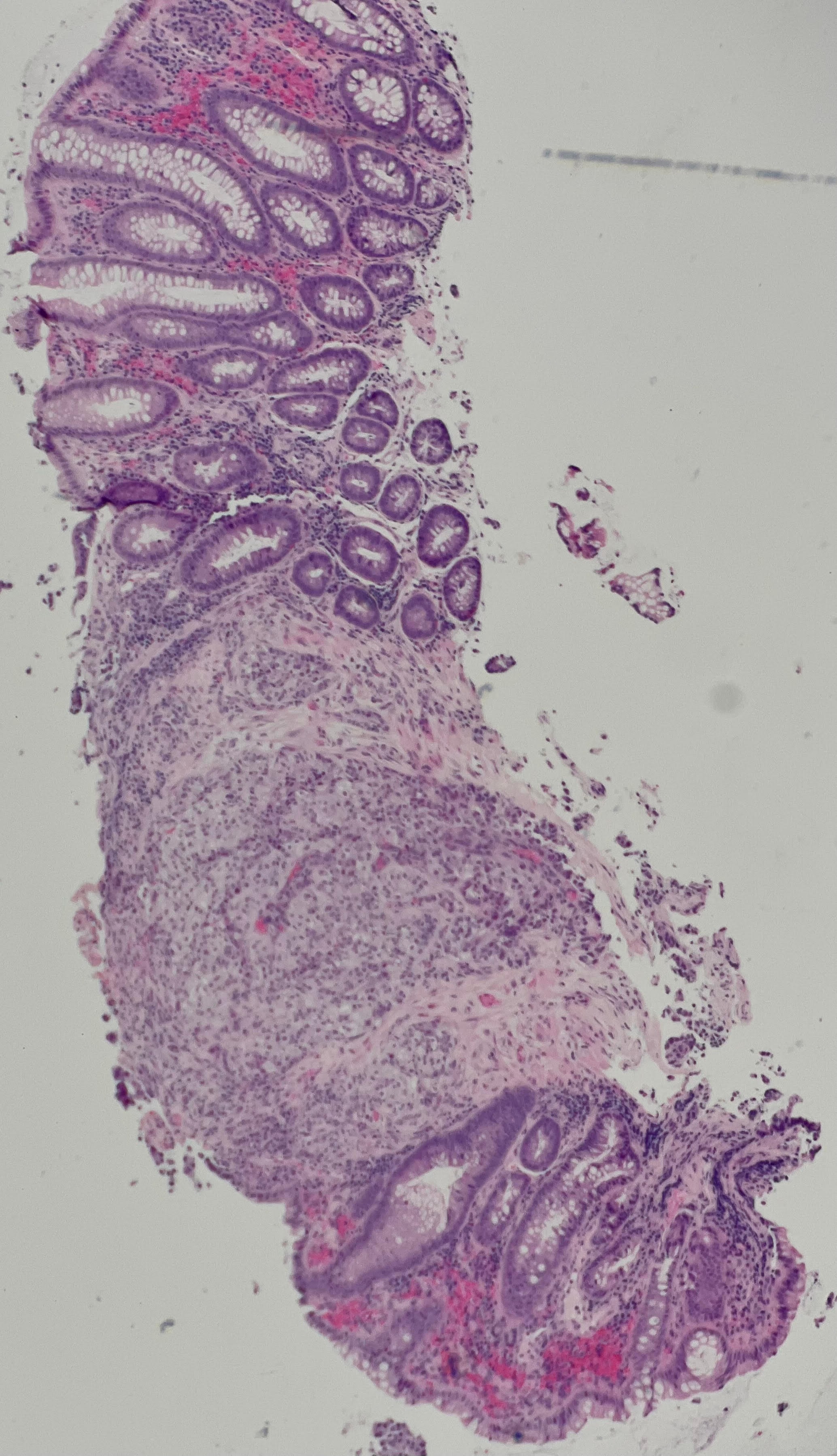Back


Poster Session B - Monday Morning
Category: Colon
B0145 - Renal Cell Carcinoma With Rare Colon Metastasis
Monday, October 24, 2022
10:00 AM – 12:00 PM ET
Location: Crown Ballroom

Has Audio

Brandon Wiggins, DO, MPH
Ascension Genesys Hospital
Grand Blanc, MI
Presenting Author(s)
Brandon Wiggins, DO, MPH, Fady Banno, MD, Kyle Knight, DO, Daniel Ramirez, DO, Mark J. Minaudo, DO
Ascension Genesys Hospital, Grand Blanc, MI
Introduction: RCC, a neoplasm originating in the renal cortex, constitutes 80-85% of primary renal neoplasms, and accounts for approximately 3% of all malignancies in adults. RCC carries a median survival rate of 8 to 31 months, although distant metastases at the time of diagnosis are associated with worse outcomes.
Metastasis in RCC is seen in roughly 25% of all cases, and generally involves lungs, bones, liver, and brain. Although RCC has the potential to metastasize to every distant organ in advanced disease, metastases to the gastrointestinal tract are very rare.
Case Description/Methods: A 45-year-old African American male with a past medical history of end stage renal disease and hypertension presented to the emergency department with weakness, abdominal bloating, and 15 pound weight loss for one month.
He had not made urine in years, however in the prior month he began to have painless hematuria.
Computed tomography (CT) of the abdomen demonstrated lymphadenopathy throughout the abdomen, ascites, bilateral atrophic, cystic kidneys, and renal transplant in the right pelvis. Paracentesis was performed and cytopathology of the peritoneal fluid collected was suspicious for adenocarcinoma.
The patient underwent upper and lower endoscopy that revealed atypical segmental sigmoid colitis, which was biopsied. Biopsy was suggestive of metastatic disease. Immunohistochemical analysis was remarkable for PAX8+, CDX2-, CK20- consistent with a renal cell carcinoma metastasis.
Patient was unable to receive chemotherapy or radiation due to performance status and went into hospice.
Discussion: Gastrointestinal metastasis is rare in RCC. Compared to the stomach and small bowel, colon metastasis is even more rare and has little mention in medical literature. The most prevalent malignancies that spread to the colon are breast cancer, stomach cancer and melanoma.
The duration between diagnosis of the initial tumor and metastasis may range from months to years. The colon metastasis timing in our example is unknown. Interestingly, the age of presentation in our patient is unusual from most RCC cases with metastasis to the colon. Many cases in prior publications were above 60 years old, with only one case being 35 years old.
The overall 5-year survival rate in patients with RCC colonic metastases can be less than 10%, but surgical resection can improve survivability to 88 percent. Unfortunately, our patient was not a candidate for surgery or medication upon presentation and perished soon after his diagnosis.

Disclosures:
Brandon Wiggins, DO, MPH, Fady Banno, MD, Kyle Knight, DO, Daniel Ramirez, DO, Mark J. Minaudo, DO. B0145 - Renal Cell Carcinoma With Rare Colon Metastasis, ACG 2022 Annual Scientific Meeting Abstracts. Charlotte, NC: American College of Gastroenterology.
Ascension Genesys Hospital, Grand Blanc, MI
Introduction: RCC, a neoplasm originating in the renal cortex, constitutes 80-85% of primary renal neoplasms, and accounts for approximately 3% of all malignancies in adults. RCC carries a median survival rate of 8 to 31 months, although distant metastases at the time of diagnosis are associated with worse outcomes.
Metastasis in RCC is seen in roughly 25% of all cases, and generally involves lungs, bones, liver, and brain. Although RCC has the potential to metastasize to every distant organ in advanced disease, metastases to the gastrointestinal tract are very rare.
Case Description/Methods: A 45-year-old African American male with a past medical history of end stage renal disease and hypertension presented to the emergency department with weakness, abdominal bloating, and 15 pound weight loss for one month.
He had not made urine in years, however in the prior month he began to have painless hematuria.
Computed tomography (CT) of the abdomen demonstrated lymphadenopathy throughout the abdomen, ascites, bilateral atrophic, cystic kidneys, and renal transplant in the right pelvis. Paracentesis was performed and cytopathology of the peritoneal fluid collected was suspicious for adenocarcinoma.
The patient underwent upper and lower endoscopy that revealed atypical segmental sigmoid colitis, which was biopsied. Biopsy was suggestive of metastatic disease. Immunohistochemical analysis was remarkable for PAX8+, CDX2-, CK20- consistent with a renal cell carcinoma metastasis.
Patient was unable to receive chemotherapy or radiation due to performance status and went into hospice.
Discussion: Gastrointestinal metastasis is rare in RCC. Compared to the stomach and small bowel, colon metastasis is even more rare and has little mention in medical literature. The most prevalent malignancies that spread to the colon are breast cancer, stomach cancer and melanoma.
The duration between diagnosis of the initial tumor and metastasis may range from months to years. The colon metastasis timing in our example is unknown. Interestingly, the age of presentation in our patient is unusual from most RCC cases with metastasis to the colon. Many cases in prior publications were above 60 years old, with only one case being 35 years old.
The overall 5-year survival rate in patients with RCC colonic metastases can be less than 10%, but surgical resection can improve survivability to 88 percent. Unfortunately, our patient was not a candidate for surgery or medication upon presentation and perished soon after his diagnosis.

Figure: Hematoxylin and Eosin Staining Demonstrating Normal Colonic Mucosa with Abnormal Renal Cell Carcinoma Metastasis
Disclosures:
Brandon Wiggins indicated no relevant financial relationships.
Fady Banno indicated no relevant financial relationships.
Kyle Knight indicated no relevant financial relationships.
Daniel Ramirez indicated no relevant financial relationships.
Mark Minaudo indicated no relevant financial relationships.
Brandon Wiggins, DO, MPH, Fady Banno, MD, Kyle Knight, DO, Daniel Ramirez, DO, Mark J. Minaudo, DO. B0145 - Renal Cell Carcinoma With Rare Colon Metastasis, ACG 2022 Annual Scientific Meeting Abstracts. Charlotte, NC: American College of Gastroenterology.
